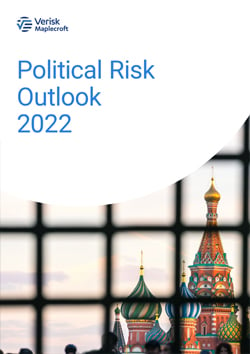Political Risk Outlook 2022: Executive Summary
Political Risk Outlook 2022
by Matthew Moshiri,
Coming in the wake of the Covid-19 pandemic, Russia's invasion of Ukraine has crystalised minds to the fact that improbable events can, and do, change the global business environment overnight. Companies that focus on building resilience and flexibility can mitigate the worst impacts of external shocks by detecting them early. They are better positioned to ride out these waves of uncertainty and come out stronger on the other side.
In this year’s Political Risk Outlook, we concentrate on the major structural risks that are set to disrupt operations, investments and supply chains, put people and assets at risk, and worsen the human rights situation in countries crucial to the supply of goods and natural resources. The increasingly interconnected risk environment means all markets are facing a rockier future through 2023. This makes managing ESG risks more important than ever. It is the organisations that think in ‘big picture’ terms that will weather the storm best.
Pandemic and war leave middle-income countries up against the ropes
Entering the third year of the pandemic, economies across the globe have focused on establishing a ‘new normal’. But unlike the rebounds of 2021, the pace of recovery has cooled and inflation is biting back. The combination of pandemic stimulus packages, and supply chain disruptions caused by China’s zero-tolerance policy for Covid and Russia’s invasion of Ukraine are hitting pockets everywhere. But unlike high-income economies, where governments have more spending capacity, and low-income ones, in which there is no societal expectation for government support, it is middle-income countries will bear the brunt of social discontent.
Crime remains top security threat
If there is one group that has shown resilience, adaptability and appetite for growth during the pandemic, it is organised crime in the Americas. Indeed, crime is the biggest security issue facing companies in major cities across the world, putting staff, assets and supply chains at risk. In Latin America, as the pandemic deepened power vacuums and disrupted legal as well as illicit supply chains, criminal groups expanded their geographic presence and diversified sources of revenue.
This partly explains why, in the latest instalment of our Cities@Risk series, which ranks 579 urban centres with a population over 1 million on their exposure to a range of threats, Latin America emerges as the world’s crime hotspot, with 62 of the 100 riskiest cities. Eight of these, including Chihuahua, Medellín and San Salvador, record the highest possible risk scores. Crime risks are also rising in the US.
Russia’s invasion of Ukraine was once again a key driver of risk. In the Cities@Risk Conflict Intensity Index the overall picture was largely stable, with one exception: Kyiv. The Ukrainian capital faced an existential threat in 2022-Q1. Ukraine’s staunch defence – underwritten by weapon transfers from Western partners – prevented the city’s fall into Russian hands, but the toll is reflected in its deteriorating risk score.
Structural weaknesses make coups three times more likely in Africa
The occurrence of six coups between 2021 and 2022 appeared to send government stability back in time. Now, the question is not whether, but where another military takeover will happen. And while coups remain an overall rare event, our research shows that Africa is three times more likely than any other region to host the next one. Based on the structural factors we have identified as common weaknesses in countries that have experienced putsches, Bolivia, Côte d’Ivoire, Gabon, Guinea, Iraq, Kyrgyzstan, Madagascar and Zimbabwe are among the most vulnerable, although mitigating factors will likely prevent a coup in some of them.
Russian invasion puts other EMs under the ESG spotlight
Russia’s invasion of Ukraine laid bare the ethically questionable ESG strategy of some emerging and frontier government bondholders. Our Sovereign ESG Ratings confirm that if Russia is now unacceptable, several other portfolio stalwarts should also merit fresh scrutiny. These include Turkey, Egypt, Saudi Arabia and Indonesia.
Geopolitical shifts suggest that the claim that all emerging markets in a portfolio can be gradually prodded into alignment with the values of ESG investors no longer holds. And this, taken in combination with new regulations in Europe (and soon in the US) demanding that funds do ‘what they say on the tin’, means that something’s got to give, sooner or later.
